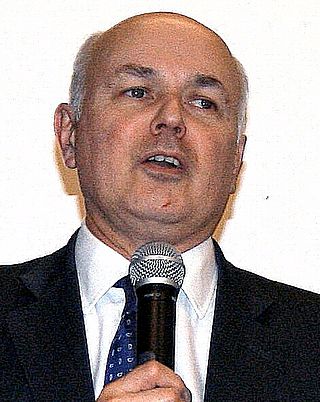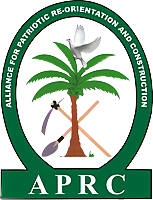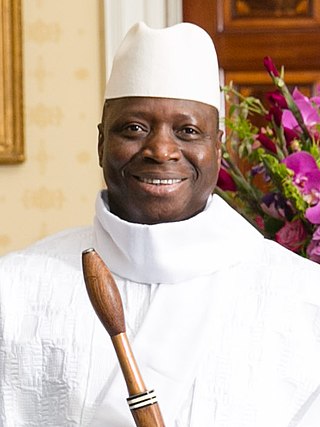
Politics of The Gambia takes place within the framework of a presidential republic, whereby the President of The Gambia is both head of state and head of government, and of a multi-party system. Executive power is exercised by the government. Legislative power is vested in both the government and parliaments.

Local elections took place in various parts of the United Kingdom on 1 May 2003, the same day as the Scottish Parliamentary and the Welsh Assembly elections. There were local elections for all councils in Scotland and in most of England. There were no local elections in Wales, Northern Ireland or London.

The United Democratic Party is a political party in the Gambia, founded in 1996 by 3 political parties and choose the human rights lawyer, freedom fighter, ANM Ousainou Darboe to be the party leader and Secretary General. As a candidate in the presidential election of 18 October 2001, he came second with 32.6% of the popular vote; he took second place again in the 22 September 2006 presidential election with 26.7% of the vote. The 17 January 2002 parliamentary election was boycotted by the party. In the 25 January 2007 parliamentary election, the party won four out of 48 seats.

The Alliance for Patriotic Reorientation and Construction (APRC) is a political party in The Gambia. Founded by army officers who staged a coup in 1994, it was the dominant ruling party from 1996 until 2016 with president Yahya Jammeh.
The National Convention Party (NCP) is a centre-left political party in Gambia. It was the main opposition party between 1975 and 1994. It was originally founded on 7 September 1975 when it first launched at Busumbala by former vice-president Sheriff Mustapha Dibba two weeks after his expulsion from the People's Progressive Party (PPP). It initially welcomed the 1994 coup but was banned from participating in elections in August 1994. Prior to the 1992 elections, the party faced a series of setbacks as many of its leaders rejoin the PPP. Its candidate at the presidential elections of 18 October 2001, Sheriff Dibba, came fourth with 3.77% of the popular vote. At the last legislative elections, held on 17 January 2002, the party won no seats. When the party was formed, the then president of the country Dawda Jawara predicted that it would not last more than three months. The NCP was part of the Coalition 2016 for the 2016 presidential election, where Adama Barrow was declared the opposition's candidate and subsequently won.

General elections were held in Zambia on 28 September 2006 to elect a President, members of the National Assembly and local government councillors. The result was a victory for the ruling Movement for Multi-Party Democracy, which won 75 of the 150 National Assembly seats and whose candidate, Levy Mwanawasa, won the presidential vote. Voter turnout was just over 70%.

Parliamentary elections were held in Gabon on 17 December 2006, although voting in seven seats took places on 24 December 2006 due to logistical problems. The ruling Gabonese Democratic Party (PDG) won 82 seats, with other parties that supported President Omar Bongo winning another seventeen seats, among them the National Woodcutters' Rally of Paul M'ba Abessole with seven seats, the Democratic and Republican Alliance with three seats, the Circle of Reformist Liberals with two seats and the Social Democratic Party with one seat.

Parliamentary elections were held in the Gambia on 25 January 2007. Forty-eight members of the National Assembly were elected, with another five being appointed by the President. The result was a victory for the ruling Alliance for Patriotic Reorientation and Construction (APRC), which won 42 of the 48 seats.

Parliamentary elections were held in Armenia on 12 May 2007. 1,364 candidates ran for the 131 seats, 41 of which were constituency seats with the remaining 90 being filled by a proportional party-list system. The electoral threshold was five per cent.
Parliamentary elections were held in Morocco on 7 September 2007, the second of King Mohammed VI's reign. Voter turnout was estimated to be 37%, the lowest in Moroccan political history. There were 33 different parties and 13 independent candidates competing for 325 assembly seats. An amount of $61 million was allocated by the Moroccan government to organize the 2007 elections.

National Assembly elections were held in Bhutan for the first time on 24 March 2008. Two parties were registered by the Election Commission of Bhutan to contest the elections; Druk Phuensum Tshogpa, led by Jigme Y. Thinley, which was formed by the merger of the Bhutan People's United Party and All People's Party, and the People's Democratic Party (PDP). A third political party, the Bhutan National Party (BNP), had its application for the registration refused.

Parliamentary elections were held in Algeria on 30 May 2002 to elect members of the People's National Assembly. The governing National Liberation Front (FLN) won a majority of seats in the election. The election suffered from a low turnout, violence and boycotts by some opposition parties.
Parliamentary elections were held in Albania on 24 June 2001. The result was a victory for the ruling Socialist Party of Albania, which won 73 of the 140 seats, resulting in Ilir Meta remaining Prime Minister. Voter turnout was 53.6%.

Presidential elections were held in the Gambia on 24 November 2011. Incumbent President Yahya Jammeh, in office since seizing power in a 1994 coup, faced Ousainou Darboe of the United Democratic Party and Hamat Bah of the National Alliance for Democracy and Development.

General elections were held in Bangladesh on 5 January 2014, in accordance with the constitutional requirement that elections must take place within the 90-day period before the expiration of the term of the Jatiya Sangshad on 24 January 2014.

General elections were held in Jamaica on 29 December 2011. The elections were contested mainly between the nation's two major political parties, the governing Jamaica Labour Party (JLP), led by Andrew Holness, and the Portia Simpson-Miller-led opposition People's National Party (PNP). The result was a landslide victory for the PNP which won 42 of the 63 seats, a two-thirds majority.

Early general elections were held in Jordan on 23 January 2013. Voter turnout was reported to be 56.6%.

The 2012 Gujarat Legislative Assembly elections were held in the Indian state of Gujarat in December 2012 for all 182 members of the Gujarat Legislative Assembly. Incumbent Chief Minister Narendra Modi of Bharatiya Janta Party (BJP), in power since 2002, was running for his fourth term. The leader of the opposition was Shaktisinh Gohil of the Indian National Congress (INC).

The 2002 West Oxfordshire District Council election took place on 2 May 2002 to elect members of West Oxfordshire District Council in Oxfordshire, England. The whole council was up for election with boundary changes since the last election in 2000. The Conservative Party stayed in overall control of the council.

Presidential elections were held in The Gambia on 1 December 2016. In a surprise result, opposition candidate Adama Barrow defeated long-term incumbent Yahya Jammeh. The election marked the first change of presidency in The Gambia since a military coup in 1994, and the first transfer of power by popular election since independence from the United Kingdom in 1965.
















